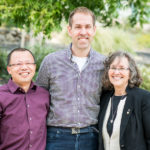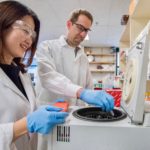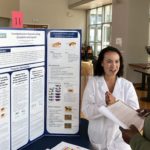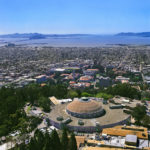Genome-wide association (GWAS) and familial studies have found mutations that disrupt the function of KDM5 proteins in patients with autism spectrum disorders and related intellectual disabilities. Biological Systems and Engineering (BSE) Division researchers Jian-Hua Mao, Antoine Snijders, and Susan Celniker, in collaboration with a team of scientists led by Xingyin Liu at Nanjing Medical University (NMU) in China, used genetic tools in Drosophila to delineate how KDM5 contributes to autism and intellectual disability.
A New Mouse Model for Studying Stomach Cancer
An international team led by researchers in Berkeley Lab’s Biosciences Area has identified a new laboratory mouse strain for studying gastric cancer. The mouse lineage is part of a population called the Collaborative Cross (CC) mouse model that was bred to have greater genetic diversity than previous populations, so as to be more comparable with humans. The team monitored hundreds of mice from different CC strains for one year and observed that one line spontaneously developed tumors—stomach and lymphoid being the most prevalent types—at an extremely high rate. Subsequent genetic analysis of the tumors in this cancer-prone line revealed that an inflammatory response regulating a protein called Nfκb1 could be a key driver of cancer susceptibility in this mouse model.
Read more in the Berkeley Lab News Center.
Another Successful Year for Biotech Partners Interns at Biosciences Area
The Biosciences Area partnered once again with Biotech Partners to provide paid summer internships to high school students. This year six high school students worked side by side with Biosciences researchers across the Area’s laboratories. The mission of the non-profit Biotech Partners is to educate underserved youth in the Bay Area with personal, academic and professional development experiences that increase participation in higher education and access to fulfilling science careers.
Biosciences Area FY17 LDRD Projects
The projects of 13 Biosciences Area scientists and engineers received funding through the FY17 Laboratory Directed Research and Development (LDRD) program. The funded projects cover a broad range of topics including the study of microbiomes in relation to their environment, plants, and gut health; catalysis for solar conversion to energy; and genomic expression in tissue. Among them were three projects related to Lab-wide initiatives. Together, these efforts account for 17.5% of the $25.2 million allocated. Lab-wide, a total of 88 projects were selected from a field of 166 proposals.
Celniker Recognized with 2016 George W. Beadle Award
Susan Celniker, Senior Scientist and Deputy Director of the Environmental Genomics & Systems Biology Division, has been honored as the recipient of the 2016 George W. Beadle Award for her outstanding contributions to the Drosophila community, in both research and service. This award was established by the Genetics Society of America (GSA) in 1999 to honor Beadle (1903–1989) who served as the President of GSA in 1946 and was a respected academic, administrator, and public servant. Celniker will be presented with this award at The Allied Genetics Conference (TAGC), July 13–17, 2016, in Orlando, Florida. Read more on GSA’s blog, Genes to Genomes.
Was this page useful?








